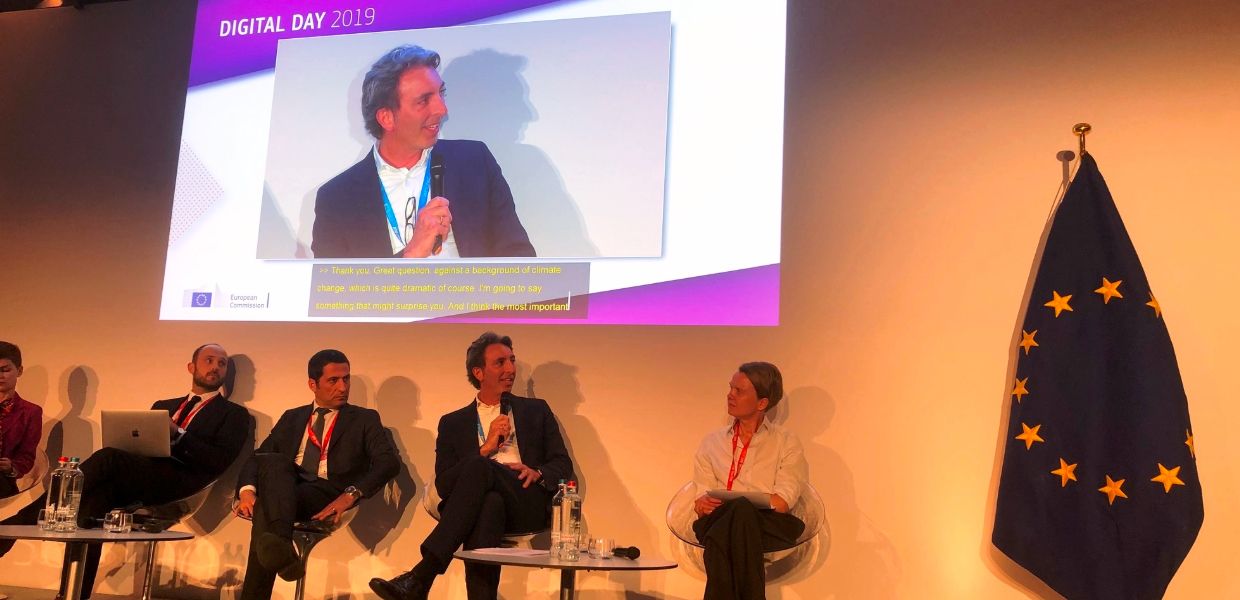Member States sign digitising cultural heritage declaration at Digital Day 2019
Speaking at Digital Day 2019 on 9 April, Harry Verwayen, Europeana Foundation Executive Director, said that the Digitising Cultural Heritage declaration was a 'sign of confidence' that the European Union sees the cultural heritage sector as of great social and economic relevance to Europe.

- Title:
- Harry Verwayen speaking at Digital Day 2019
- Creator:
- Europeana Foundation
- Date:
- April 2019
- Institution:
- Europeana Foundation
- Country:
- The Netherlands
- Copyright:
- CC BY-SA
Digital Day 2019, the third of its kind, was an opportunity for the EU and Member States to pool resources to accelerate digital developments to bring tangible benefits to our economies and societies.
Digitising Cultural Heritage declaration
As part of the day, EU Member States signed a declaration on digitising cultural heritage. Building on the momentum of the European Year of Cultural Heritage 2018, the declaration aims to advance digitisation of heritage artefacts, monuments and sites, as well as foster citizen engagement and cross-border cooperation.
Here's what Europeana Foundation Executive Director, Harry Verwayen, had to say at the event:
Without a doubt this declaration is a very important initiative. Here are three elements that I believe are particularly relevant to our sector that I would like to highlight:
1. Ten years ago, the European Union took a bold and enlightened decision; it decided that our cultural heritage was too important to be left to market forces alone to decide if and how our heritage was made available to its citizens. We decided to take the future in our own hands. From that big idea, Europeana was born.
Ten years later, Europe has a platform where close to 4,000 libraries, museums and archives have made over 50 million items from their collections available, in formats that allow use and reuse by researchers, creatives and interested citizens.
Europe did not invest in the next Google. I think it invested in something more important than that; it invested in interoperability.
The Europeana model, which leaves sovereignty in the hands of the institutions but is based on cooperation and shared standards, has become an export product that is being copied across the world, from the US to India, and from Mexico to Japan.
Interoperability is Europe’s business model and this declaration strengthens that notion.
2. Secondly, I read this declaration as a sign of confidence of the European Union that this sector is indeed a contributor of great social and economic relevance to Europe.
As the New Agenda for Culture has highlighted, Museums, libraries and archives are an integral part of a cultural and creative industry that contributes over 4.2% to the GDP of Europe.
Clearly marking the shift from the 20th to the 21st century, it employs more people than the automotive and the manufacturing industries.
We have also learned that this sector grew much faster than average during a period of economic crisis and that it employs more young professionals than any other sector.
This declaration emphasises that the cultural heritage sector should be seen as an R&D lab, an investment with a high return.
3. In order to stay competitive in an age of artificial intelligence and machine learning, we will need to step up our game. So most importantly, this declaration highlights the political will at the European level to make a significant change in the role we see for cultural heritage in the future.
Investments in 3D will lead to applications that change the way we teach, that will help to regenerate our cities, and that can contribute to social cohesion.

